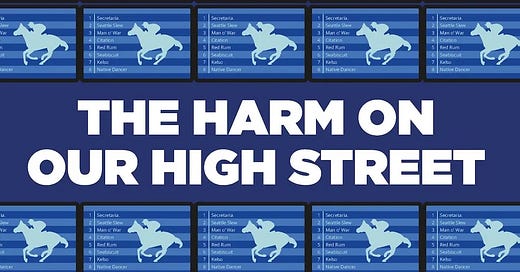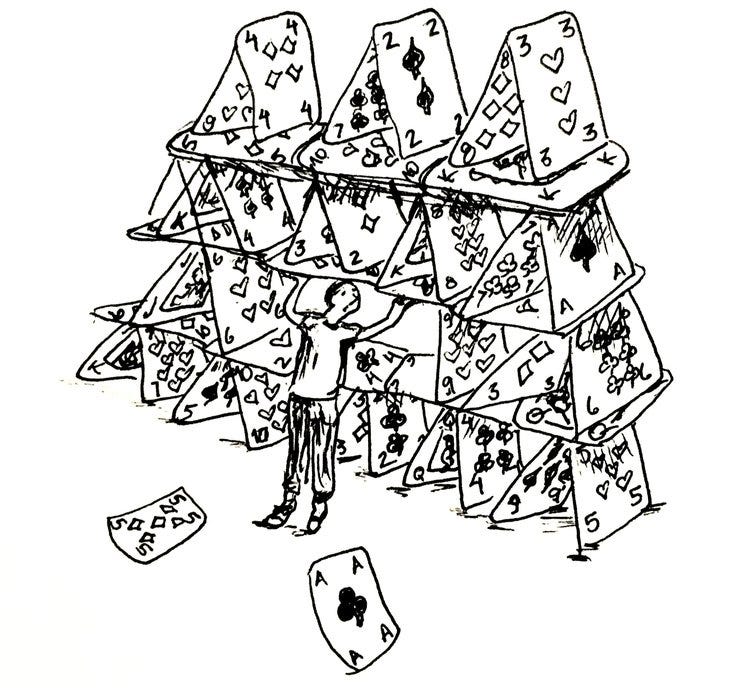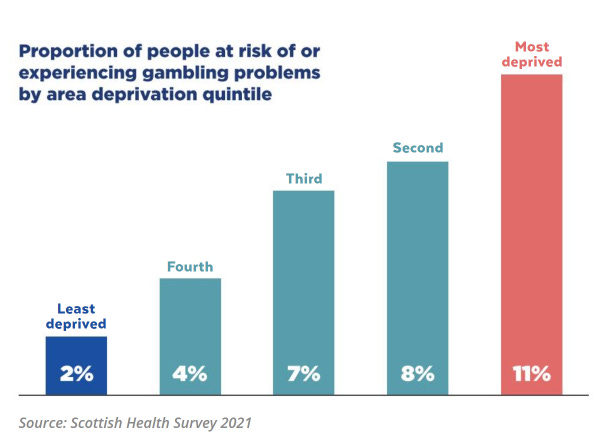How is gambling harming our communities?
Gambling is often seen as a hidden addiction, but it's one that is ever-present in the lives of those it affects.
In the latest issue of our magazine, we ran a special series on how gambling harms, and a lack of legislation around it, is disproportionately impacting the lives of people in Govanhill. Check out the all the articles below and scroll to bottom for the latest updates…
The Harm on our High Street
Gambling is an invisible harm in many communities in and around Govanhill. In the first of this multi-part feature, we use Victoria Road to explore betting establishments on our high streets, and how Govanhill compares to more affluent parts of the city.
By Jack Howse | Illustrations by Rachael Procter & Laura Hurst
Next time you walk down your local high street, count how many bookies you see. What happens inside is usually hidden by eye-catching posters advertising odds and fixtures. Only the doorways offer a glimpse inside. But once you start noticing them though, you will see they are everywhere.
In fact, the number of bookies nationally is huge. In 2020, the Gambling Commission reported that there were over 10,000 premises in Britain – more than the number of stores run by the eight largest supermarket chains in the country. The numbers are even starker here in Glasgow. It has more bookies per person than any city in the UK with one betting shop for every 3,200 people.
As people shift their spending habits online, and shops close down, we frequently hear about the death of the high street, so why are there still such a large number of betting shops on our high streets, especially considering how easy it is to place a bet online these days?
Gerda Reith is a sociologist of gambling, addiction and consumption at the University of Glasgow and has considered this very question in her research. “Bookies have been a part of communities for a long time, and it’s a kind of cultural habit.” she told us. “There's not actually many community spaces where people can go, whereas a betting shop does offer that. It's somewhere to go in, to hang around to speak to people… when there's not very many public spaces where you can go, these venues are public spaces”.
However, the number of betting shops is only half the picture – the geography of betting shops is even starker when mapping it against a geography of deprivation…
The Addiction Which is Being Ignored
One of Young Voices team, Zanib, worked in a Glasgow bookies while a student. She shares her experiences of her time there and interviews people with lived experience of gambling harms.
By Zanib | Illustrations by giacinta frisillo
Picture this. It's Saturday night, the rain is pouring down, and the shop begins to fill up fast with people from all walks of life ready to lose a couple of hundred pounds. The night is mostly people placing bets on races of £20 a go, alongside the automated spins set up on the ‘puggy’ (slot machine) with an occasional look up to see if they’ve hit the jackpot.
I worked as a bookmaker in Glasgow City Centre for over two years, mostly evenings and weekends whilst I studied for my degree. The customers came in all shapes and forms. We had the angry ones, eager to frame their loss as my problem. There were the flirters, using charm to distract from their recent losses on football predictions. Then we had the regulars, the everyday visitors who sat in the same seats, every day, to fill out their ‘Lucky 15’ bet.
Whilst there were a lot of men, there was a fair share of women too. Some carried stacks of pounds in a lunch bag ready to play a fishing game for hours, and there were those who would pop in after a three hour cleaning shift, looking for a bit of escape.
It’s easy to judge the people that came into the bookies, but the reality is gambling, like alcohol or substances, is an addiction. The customers had reasons for being there, often rooted in wider economic and societal issues…
'Nu Risti, nu Castigi' – 'You don't risk, you don't win'
How does gambling affect those within the Roma culture? We heard about difficulties people face and some of the solutions they have come up with so they can still enjoy the gambling without the harm. Published in English and Romanian.
By David Milosiu and Toni Bruce
Small ceramic tiles displaying numbers in red, yellow and blue spill and clink out onto the floor. Somewhere, a beer pops open. Coffee is poured. Laughter erupts.
We are with Lacian* and Brancu at a game of remi, (also known as rummy) a gambling card game played often by men in the local Romanian Roma community. Right now, the mood is jovial and relaxed. But Lacian tells me, things can be much more tense: “There’s no limit for the amount of money you can bet in remi. It could be £10 or £10,000. I lost mostly everything. It led to big arguments with my family. I should have brought money home, but I would gamble instead.”
It is thought that over 200,000 people in Scotland are engaged in ‘problem gambling’; either addicted to gambling or at risk of developing an addiction. We took a closer look at how gambling can affect people in our Roma community.
Of the people we interviewed, who all asked to remain anonymous, they were more likely to play in real life rather than online gambling. This ranged from poker and blackjack in the casinos, to slot machines and purchasing lottery tickets.
One man we spoke to, Florin, told us about his gambling habits: “I play a lot. I play scratch cards, I draw about four or five lottery tickets a week and I also play slots two to three times a week. I spend about £100 a week on the slots. This is my vice – I don’t smoke, I don’t drink, but I gamble.”…
Continue reading (in English)... // Continuă să citești (în română)...
What can be Done to Prevent the Crisis?
Despite long awaited reforms, the laws that regulate gambling in this country remain wildly out of date. As part of our solutions journalism coverage of health inequalities, we took a look at responses to prevent gambling harms, taking a public health approach.
By Becki Menzies
“Gambling affects the individual, but actually the cause of the problem is the environment that they live in and the fact that these gambling products are inherently harmful,” gambling addiction expert, Professor Gerda Reith told Greater Govanhill. “And when you look at it that way, instead of just treating the individual, it’s about making the product either safer or making it harder to access… and that's the public health part.”
The British Medical Association states that: “Gambling addiction is a public health menace and needs to be taken as seriously as drugs and alcohol.” Likewise the World Health Organisation considers gambling harms to be of a similar magnitude to both alcohol misuse and major depressive episodes.
Yet in Scotland, there are currently no government policies that directly address gambling harms. This falls mainly within the remit of the UK Government’s Department for Culture, Media and Sport who are due to publish its much-delayed proposed reforms to gambling laws in May, reviewing the Gambling Act of 2005. Since this act was brought in, the rise of online gambling has meant that the gambling landscape has changed dramatically and the current regulation is not working…
Gambling ‘Wet Paper’ Proves the House Wins
A long awaited white paper on regulating the gambling industry has been published. We spoke to those involved with raising awareness of gambling harms - and supporting those affected by it. They told us they were disappointed that it doesn’t go far enough and “fails to tackle an industry that profits from our poorest communities.”
By Jack Howse
Last Thursday Liz Fraser, the culture secretary in Westminster, announced the contents of a new white paper on gambling regulation reforms. Some of which include:
A new one percent levy on gambling companies to fund treatment and research into gambling harms;
Affordability checks on those who are experiencing losses above a certain threshold;
New stake limits in online gambling to match those already found in bricks-and-mortar establishments with different limits for over and under 25 year olds;
Tighter rules on special offers like free bets on online gambling sites;
Greater power given to the Gambling Commission to target things like black market sites.
The gambling industry, has changed dramatically since the last bill governing gambling laws was passed back in 2005. The biggest change has been the development of the online gambling industry. The UK is the biggest regulated online gambling market in the world, worth almost £10 billion in 2021.
As gambling has moved from the high street bookies to people’s phones, there has been an increase in children and women experiencing gambling harms.
Whilst any change to the gambling industry is welcomed by campaigners, most charities and support services do not think the reforms go anywhere near far enough.
Martin Paterson is from the Machine Zone, a CIC who made a short documentary on gambling harms which we screened at the Community Newsroom. Martin himself has suffered from the affects of gambling harms and told Greater Govanhill:
“This White Paper proves the house wins. There is absolutely nothing on gambling adverts or sponsorship in sport and loads kicked into the long grass including more consultation regarding online stakes. Everything else is just asking the industry to do more on a voluntary basis.
This multi-part feature produced by our team was paid for by the Glasgow Gambling Harms Fund available from the Glasgow Council of Voluntary Services (GCVS) as part of a pathfinder project to support the delivery of the National Strategy to Reduce Gambling Harms in Scotland and the Public Health Priorities.








